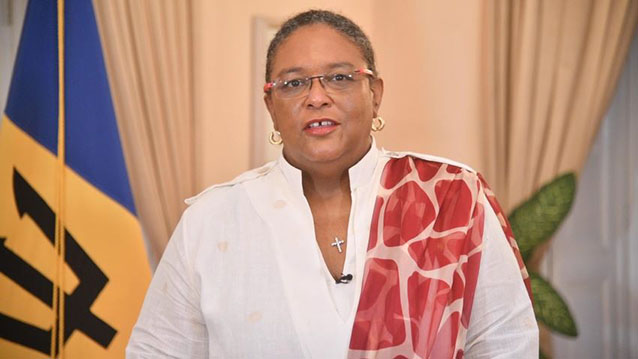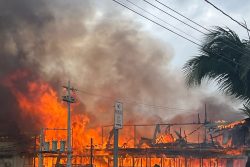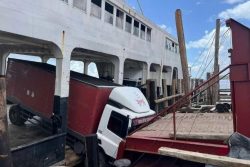A number of civil society activists have written to Barbadian Prime Minister Mia Mottley urging that she take the lead in convening CARICOM leaders and experts in determining the risks posed to the Caribbean by what they described as the “reckless pace” of oil exploration in Guyana’s Exclusive Economic Zone (EEZ).
The March 27 letter to Mottley enclosed a map prepared by ERM, the consulting firm that has done all of the Environmental Impact Assessments for ExxonMobil’s well-drilling programmes.
The letter signed by Alfred Bhulai, Janette Bulkan, Dennis Henry, Jerry Jailall and Darsh Khusial among others warned that “Even a small oil spill would bespoil the Caribbean Sea and threaten the livelihoods of fishers and the tourism industry, not to mention the harms to marine life and ecosystems. We draw to your attention the limited capacity in the Guyanese regulatory bodies to exercise oversight of the offshore oil industry, which imperils the entire Caribbean’.
These activists and others have been pressing the authorities here to take steps to provide full assurances about the safety of ExxonMobil’s offshore operations and insurance coverage in the event of a spill. The authorities here have not been forthcoming on many of the issues raised.
Noting that the subsea drilling for exploration and extraction wells extends two miles deep into the earth’s crust, beneath a mile of water, the letter said that ExxonMobil alone has and is now drilling at least 16 development/production wells in the Liza-1 and -2 fields and 6 wells already in the Payara field. The letter further noted that ExxonMobil currently plans to drill a total of 158 wells in four oil fields by 2030 in the southeast corner of the Stabroek tract alone.
The letter cited Robert Bea, who it said was among the world’s foremost forensic engineers and a leading expert on the 2010 BP Macondo oil spill in the Gulf of Mexico as expressing worry that Exxon’s operations “appear to lack the appropriate preparation or planning to head off a deepwater blowout and major oil spill”.
In particular, they said that Bea is worried about a loss of well control, or blowout – which could cause a catastrophic oil spill. They added that he finds that ExxonMobil has not kept the risks of such events as low as “reasonably practicable”, based on the documents he reviewed.
Scientific studies, the letter said, have established the harms to marine life from the frequent and intense noises caused by deepsea oil production and from the discharge of wastes.
“The accompanying breakneck pace of 4D seismic surveys and the velocity of the current and projected oil drilling and pumping are greater than any other exploration and/or extraction that have occurred hitherto globally for offshore oil extraction”, the letter contended.
The signatories to the letter pointed out that at the recently held Guyana Energy Conference and Expo, Mottley had stated, “We are people who have been victims of colonization and exploitation.” The signatories argued that over the past four years, Guyanese and global citizens have “painstakingly detailed the shockingly one-sided nature” of the 2016 Petroleum Agreement signed by the Government of Guyana with Esso Exploration and Production Guyana Limited, CNOOC of China and Hess of the USA for the current oil operations.
The signatories expressed admiration for Mottley’s advocacy on issues of climate heating and its repercussions, particularly for small-island states.
“Honourable Prime Minister, we appeal to you, cognizant of your special relationship with the Government of Guyana. We hope that you will urge the governments of CARICOM to evaluate the scale, intensity and risks posed to the entire Caribbean by the ongoing high velocity oil exploration and production in Guyana’s EEZ. We hope you will assess the deeply inequitable and neo-colonial arrangements between the government of Guyana and petroleum companies, in which the public wealth of Guyana is privatized and negative environmental harms to both Guyana and the Caribbean are socialized”, the letter stated.








